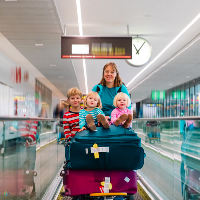Jacquie Rahm, CCLS, CTRS-C, YMHFA

Traveling offers opportunities to have new experiences and practice skills that positively affect child development. New experiences gained from traveling allow children to broaden their understanding of people, places, things, and cultures while also expanding creativity and curiosity. Traveling also offers opportunities to practice autonomy, problem-solving, self-regulation, and adaptability through navigating new and out-of-their normal experiences. Traveling with the family/household unit allows children to strengthen their bonds with caregivers, develop a sense of belonging and identity through creating traditions, and creating memories with loved ones.
How to Prepare
When planning a vacation or other opportunity for children to travel, it may be beneficial to incorporate some activities that positively contribute to child development. Hands-on experiences allow children the opportunity to feel involved, develop mastery, and practice autonomy. These experiences could be simple, such as packing a bag for the car or airplane ride, or more intentional such as visiting a museum on the vacation. When possible, choosing a destination that would allow children to meet and socialize with new people, or people they do not get to interact with very often, such as extended family, helps them grow their understanding of the world and practice social and self-regulation skills. It is also beneficial if children are able to experience new cultures, customs, and languages when traveling to further broaden their understanding of the world and empathy for others.
However, some aspects of traveling may be more challenging for some children than others. Some aspects to consider include the length of the travelling journey, new sights or sounds the child may experience, anticipated crowds or amount of people the child would need to interact with and/or navigate through, the amount of personal space the child and family will have on the travel, and when there would be opportunities for eating, bathroom, sleep, and gross-motor movement and play. Knowing the child’s developmental age and stage, as well as any specific areas of stress or comfort for the child, is extremely helpful in planning a travel experience that will positively support that child’s development and build fond memories.
Logistical Tips:
Prepare for the adjustment period. Travel can be very disruptive for typical routine and can dysregulate a person of any age. Begin talking about the travel and expected changes to routine early, practice routine changes as able, and have a coping plan ready in case big emotions or behaviors come up.
Try to plan travel around your child’s sleep schedule. If they are able to sleep in the car/on a plane, try to travel during nap and bedtime. If not, try to travel during a natural calm-down time in their day and maintain that routine during the travel. For example, during a reading time.
Plan for periods to eat, sleep, and play. Children should have ample opportunities to get out of their car seats and experience gross-motor movement.
Bring emergency stashes of must-have items such as wipes, medications, snacks, and extra clothes.
Comfort items are also important to have handy, but there is always a risk of items getting lost or damage. If able, consider getting a duplicate of a specific comfort item so you have a backup. For more visibly loved items, it may be difficult to have a backup that is not clearly new and a replacement. In this case, consider introducing the option for the child to choose a new comfort item as their “travel” item so that their irreplaceable comfort item can stay safe at home or packed in luggage, reducing the risk of it getting lost or damaged during the travel journey. Introducing a novelty item children only use when traveling may also help with any difficult transitions around traveling the child may experience.